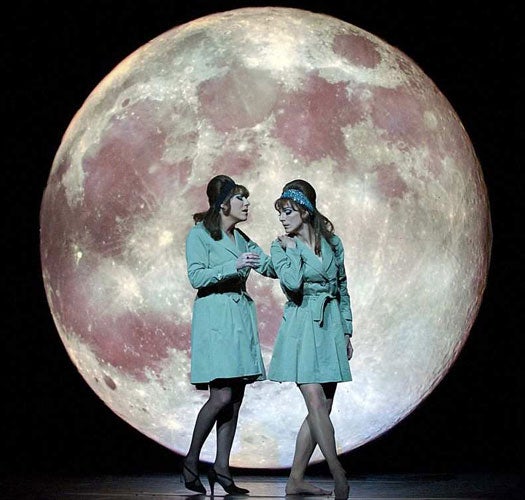Three Short Works, Royal Opera House, London

Your support helps us to tell the story
From reproductive rights to climate change to Big Tech, The Independent is on the ground when the story is developing. Whether it's investigating the financials of Elon Musk's pro-Trump PAC or producing our latest documentary, 'The A Word', which shines a light on the American women fighting for reproductive rights, we know how important it is to parse out the facts from the messaging.
At such a critical moment in US history, we need reporters on the ground. Your donation allows us to keep sending journalists to speak to both sides of the story.
The Independent is trusted by Americans across the entire political spectrum. And unlike many other quality news outlets, we choose not to lock Americans out of our reporting and analysis with paywalls. We believe quality journalism should be available to everyone, paid for by those who can afford it.
Your support makes all the difference.The Royal Ballet's latest triple bill is an unsatisfactory experience. Will Tuckett's Seven Deadly Sins still doesn't work, Mats Ek's Carmen is still endlessly dreary, while Christopher Wheeldon's DGV: Danse à grande vitesse has lost momentum. In a season full of odd programming, this looks unfortunately characteristic.
The Seven Deadly Sins does sound better than it did when new. When staging this Weill/Brecht work in 2007, Tuckett cast the singer Martha Wainwright as one of the two Annas, with Zenaida Yanowksy as her dancing sister. Wainwright has grown to be the best thing in this production. This time, her words are much clearer, making distinctive points with Auden's translation of Brecht's text.
Wainwright's voice is both smoky and innocent, while she moves easily in and out of the action. Tuckett's opening image is terrific: the two Annas, with matching raincoats and careful hairdos, hand in hand in the moonlight. They look vulnerable, trying to be sophisticated.
Tuckett runs out of ideas almost immediately. It's hard to tell one sin from another. They all involve Anna being lugged around by her partners, legs splayed and stocking tops showing. In the text of "Pride", Anna dances in a cabaret, forced to give up her ideas of art, becoming a stripper. But Tuckett's Anna is in her knickers from the beginning. There's nothing to distinguish her from the other strippers, so where's the story?
It's still a better bet than Mats Ek's cartoon Carmen. Dancers scream, smoke cigars and kill each other. Using music from Bizet's opera, Ek has thrown in elements of Propser Merimée's original novella. The storytelling is incomprehensible. I still don't know how many people died, or who they all were. It's also very, very long.
Ek doesn't try to give his characters inner life. They're cartoonish but oddly anonymous. Seducing José, Carmen touches his chest, pulling out a long red scarf. Later, meeting the bullfighter, she pulls a long pink scarf from his trousers. Marie-Louise Ekman's costumes exaggerate the characters' identities. The bullfighter wears gold lamé, while Carmen has impossibly long metallic skirts. Tamara Rojo is a vigorous Carmen. Her timing is good, and she makes the most of Ek's weak jokes.
Wheeldon's DGV: Danse à grande vitesse has lost a little of its speed. Four couples plunge in and out of the action, sometimes dancing slowly against a fast-moving corps. Michael Nyman's music is full of chugging rhythms, sometimes trapping Wheeldon in tight patterns. In one section, set to a burst of drumming, the whole company break into almost military drill, driving through patterned sequences.
This revival needs more drive, but it still has welcome energy and invention. Nathalie Harrison moves boldly, gorgeously partnered by Gary Avis. Lauren Cuthbertson and Eric Underwood are smoothly assured.
To 21 February (020-7304 4000)
Join our commenting forum
Join thought-provoking conversations, follow other Independent readers and see their replies
Comments